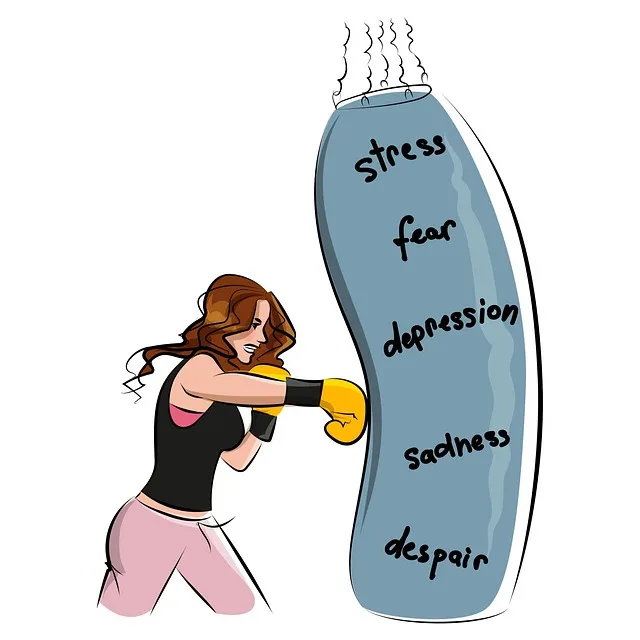Evaluating therapist quality in Kaiser's Broomfield mental wellness programs relies on client feedback and standardized assessment tools, focusing on communication skills, empathy, and therapeutic alliance. Direct participant involvement through open communication enhances program effectiveness, identifying successful strategies like Empathy Building for tailored care. A rigorous data analysis combining qualitative and quantitative methods tracks KPIs like stress levels to implement evidence-based strategies, ensuring an empathetic environment with high-quality therapist care in Broomfield.
Evaluating mental wellness programs is crucial for ensuring their effectiveness, especially when considering the well-being of participants. This article explores three key methods employed by Kaiser Permanente in Broomfield to assess their therapy services. We delve into tools to gauge therapist quality, the power of participant feedback, and data analysis techniques that drive continuous program improvement. By examining these aspects, we aim to highlight how Kaiser’s approach can contribute to positive mental health outcomes for clients.
- Assessing Therapist Quality: Tools and Techniques
- Participant Feedback: Voice in Evaluation
- Data Analysis for Program Improvement
Assessing Therapist Quality: Tools and Techniques

Evaluating therapist quality is a critical component of any mental wellness program, particularly when considering programs like those offered by Kaiser in Broomfield. Assessing the skills and effectiveness of therapists can greatly impact the success and outcomes of clients participating in Emotional Well-being Promotion Techniques. One effective method to gauge therapist quality involves client feedback mechanisms. Post-session evaluations allow clients to share their experiences, providing insights into the therapist’s communication, empathy, and overall ability to create a safe space for therapy.
Additionally, standardized assessment tools can be utilized to measure specific aspects of therapy delivery. These instruments often include scales evaluating therapeutic alliance, engagement in treatment, and symptom reduction, which are essential factors in Anxiety Relief. By combining client feedback and structured assessments, mental wellness coaching programs can ensure they meet high standards and continuously improve their services, ultimately enhancing the overall effectiveness of Mental Wellness Coaching Programs Development.
Participant Feedback: Voice in Evaluation

Involving participants directly in the evaluation process is a powerful method to enhance mental wellness program effectiveness. Participant feedback offers valuable insights into their experiences and perceptions, ensuring that the program aligns with their needs. By encouraging open communication, individuals can share their thoughts on various aspects, including therapist skills, treatment techniques, and overall satisfaction. This two-way dialogue allows for continuous improvement, as program designers can adapt and refine their approaches based on genuine feedback from those who have directly benefited or struggled within the framework.
When evaluating mental health initiatives, particularly at a facility like Kaiser in Broomfield, participant voices become indispensable. Their feedback can highlight successful elements such as the implementation of Empathy Building Strategies or Compassion Cultivation Practices, which have shown promise in Depression Prevention efforts. By embracing this input, the program can be tailored to foster a sense of belonging and understanding, ultimately enhancing the therapeutic experience.
Data Analysis for Program Improvement

Evaluating a mental wellness program involves meticulous data analysis to gauge its effectiveness and identify areas for improvement. At Kaiser, located in Broomfield, therapists employ various qualitative and quantitative methods to assess participant progress and overall program success. This includes analyzing survey responses from participants, which can reveal insights into their experiences, satisfaction levels, and perceived benefits of the program. By closely examining these feedback mechanisms, therapists can pinpoint specific strategies that resonate with individuals and those that may need tweaking.
Furthermore, data analysis extends to tracking key performance indicators (KPIs) related to mental wellness, such as stress levels, emotional regulation, and coping mechanism adoption. This analytical approach allows for the implementation of evidence-based empathy building strategies and burnout prevention strategies for healthcare providers, fostering an environment where both patients and therapists thrive. Emotional intelligence plays a pivotal role in this process, enabling therapists to interpret data accurately and tailor interventions accordingly.
Evaluating mental wellness programs is a multifaceted process, from assessing therapist quality using robust tools like those examined for the Kaiser Permanente Broomfield location, to gauging participant feedback and analyzing data. By incorporating these methods, organizations can ensure their programs meet high standards, offering effective support to those in need. Regular evaluation enables continuous improvement, fostering an environment where both therapists and participants thrive, ultimately enhancing overall mental wellness outcomes.






